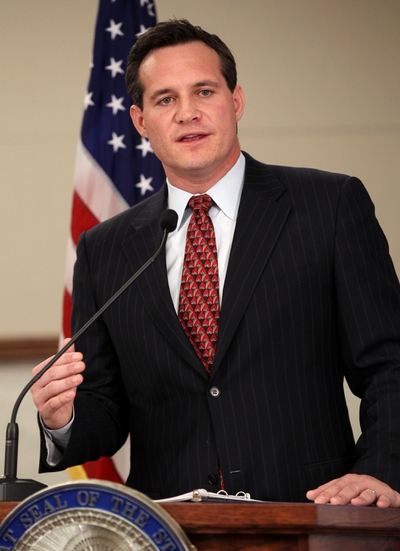Published Thursday, Aug. 8, 2013 | 4:01 p.m.
Updated Thursday, Aug. 8, 2013 | 4:44 p.m.
In Nevada politics, what constitutes a “gift” could mean the difference between elected officials following or breaking the law.
Secretary of State Ross Miller is seeking clarification from state agencies about how they’ve defined the word “gift” in the past. He sent a letter Wednesday to the Legislative Counsel Bureau and the Nevada Commission on Ethics asking for any formal or informal opinions or interpretations of what a gift means in the context of what elected officials must disclose on annual financial disclosure forms.
Elected officials in Nevada must disclose gifts worth more than $200 on disclosure forms they file with Miller’s office. But Miller says people in elected office routinely fail to follow the law because it doesn't define a gift.
Absent a statutory definition, a body of legal opinions could at least provide some guidance for what elected officials must disclose if they want to obey to the law.
The secretary of state, a Democrat, tried this year to pass a bill that would have added a definition of a gift to state law.
That bill failed to pass the Legislature during the final hours of the session, which ended June 3.
“I don’t think any Nevadan is naive enough to think that a bill that was put out in October simply ran out of time,” Miller said in June, several minutes after it became clear that the Legislature would not act on his bill before the 120-day legislative session ended. “They didn’t want to pass campaign finance or ethics reform because it affects them.”
Following this failure, Miller said he’d press forward with more rigorously enforcing existing law — hence Miller’s request for opinions that have been issued from the ethics commission and the Legislature’s legal counsel.
“This will assist the Secretary of State’s Office on this issue and put the Elections Division on notice of what direction and guidance, if any, the LCB (Legislative Counsel Bureau) has provided to state legislators or other public officers on this topic,” Miller’s wrote to the Legislative Counsel Bureau, the state division that drafts bills and provides legal interpretations for legislators.
The law as it stands has allowed elected officials to skirt any direct violation of it.
For instance, state lawyers advising legislators said in 2011 that Assemblymen Kelvin Atkinson, D-North Las Vegas, and William Horne, D-Las Vegas, didn’t have to disclose a trip to England that was paid for by the company PokerStars.
Legislative legal counsel said neither had to report the trip as a gift on disclosure statements because it was a “fact-finding” mission. Atkinson and Horne used this opinion to defend the trip.
The Legislative Counsel Bureau doesn’t typically release such opinions unless the person who requested it authorizes the bureau to do so, said Rick Combs, the bureau's director.
But he said he hasn’t yet seen the letter and will have to chat with Miller’s office. Combs said Miller could seek an opinion from his own legal counsel, the state’s attorney general. But a representative from the Secretary of State’s Office said Miller is not yet seeking an opinion from Attorney General Catherine Cortez Masto.
Caren Cafferata-Jenkins, executive director of the Nevada Commission on Ethics, was not available Thursday to return a phone call.


Join the Discussion:
Check this out for a full explanation of our conversion to the LiveFyre commenting system and instructions on how to sign up for an account.
Full comments policy